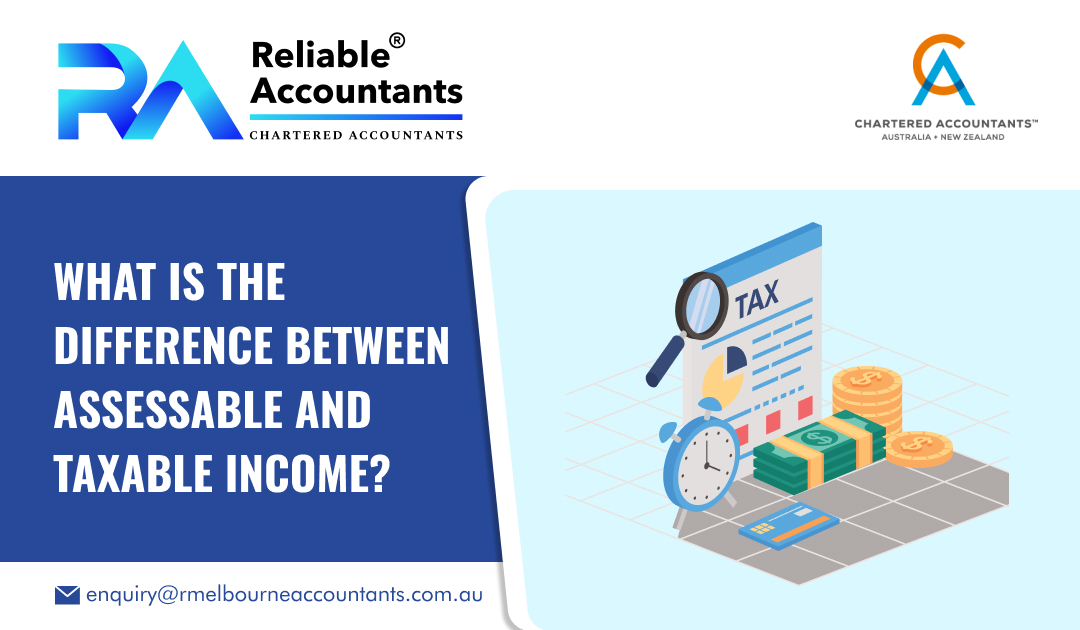In the Australian income tax system, income tax is imposed on taxable income during the fiscal year, from 1 July to 30 June. Now, you may have a question: what is total taxable income? How is taxable income different from assessable income? Learn about the difference between assessable and taxable income.
Assessable Income Meaning
Most of the earned income will be considered assessable income. This income is income that you are liable to pay tax on if you earn enough to surpass the tax-free threshold. During tax season, every part involved in taxes is considered by taxation accountants, so ensure to keep a record of every expense and income. Now, let’s discuss the list of assessable income that you are required to declare:
- salary and wages
- gratuities, tips and other payments for your services
- some allowances, such as for laundry and clothing
- interest from bank accounts
- dividends and other income from investments
- overtime and bonuses that an employee receives
- commission a salesperson receives
- pensions
- rent.
You may also receive income in terms of services or goods instead of money. You should declare the market value of these services or goods as assessable income in your tax return. For instance, you may receive makeup, clothing, tools, or accessories from fans or subscribers of your online platforms or businesses that are looking to work with you. If you are receiving cash income, including cash cheques, you should declare the cash as income in your tax return.
What is the Taxable Income in Australia?
Your total taxable income is determined by subtracting allowable deductions from your assessable income. This taxable income is then used to calculate the amount of tax you are required to pay.
Assessable income − allowable deductions = taxable income
Allowable deductions don’t directly minimise the tax amount that you pay, they minimise your taxable income, which as a result reduces the tax amount you must pay. If you are unfamiliar with the calculations involved in taxes, you can consult a tax accountant near your area by searching ‘tax accountants near me’. They can help you prepare and lodge income tax returns.
What is Exempt Income?
As the name implies, exempt income is income that you are not liable to pay tax on. You may still have to declare this income on your tax return to use it in other calculations. Here are the examples of exempt income:
- some government payments and pensions, including the invalidity pension
- some education payments.
You are not liable to pay any income tax on exempt income if the only income you get during an income year is exempt income.
Non Assessable, Non Exempt Income
Non-assessable, non-exempt income refers to amounts you don’t need to report in your tax return. You also can’t claim deductions for this type of income. Examples of non-assessable, non-exempt income include:
- The tax-free portion of an employment termination payment (ETP)
- Government super co-contributions
- Income earned by foreign workers under the former Seasonal Worker Programme or the Pacific Australia Labour Mobility (PALM) scheme
- Certain disaster relief payments and grants
How to Reduce Taxable Income in Australia?
Here are some ways to lower taxable income legally in Australia:
Claim potential tax deductions
When you look for different ways to reduce taxable income, you would prefer to consider possible tax deductions.
- Tax deductions for the cost of managing your tax matters
If you seek help from an accountant to handle your tax affairs, then you can claim a tax deduction for expenses involved in taking advice from an accountant and preparing and lodging tax returns.
- Take advantage of salary packaging
It is also called salary sacrificing, which involves arranging with your employer to package your salary into some benefits.
- Keep accurate records
Accurate record-keeping is crucial for tax purposes. With bookkeeping services in Melbourne, you can make sure to have accurate business records. Accurate records ensure accurate tax returns, minimise errors, increase tax deductions, and reduce tax liability.
Conclusion
You must know the difference between assessable income and taxable income along with the ways to reduce taxable income. If you find it difficult to manage tax affairs, you can seek help from Reliable Melbourne Accountants.
Other Useful Links:
Accountants Melbourne
Accountant for Small Business Near Me

